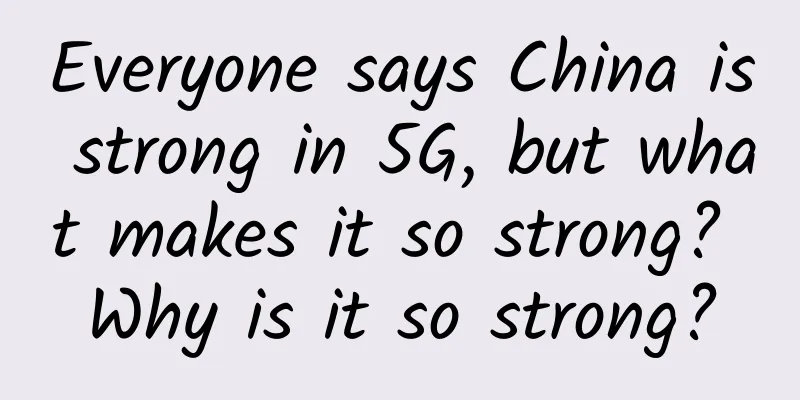Everyone says China is strong in 5G, but what makes it so strong? Why is it so strong?

|
Liu Xingliang (hereinafter referred to as "Liu"): Recently, the Defense Innovation Board under the US Department of Defense released a report entitled "Opportunities and Challenges of the 5G Ecosystem for the Department of Defense", which said: China's 5G is already in a leading position in the world. What is the actual situation? Are we the ***? Xiang Ligang (hereinafter referred to as "Xiang"): There is no doubt about this. From the perspective of the entire ecosystem: the first is the standard; the second is the chip; the third is the communication system; the fourth is the communication terminal, let's take the mobile phone alone, the mobile phone; the fifth is various other terminals based on 5G; the sixth is the business R&D capability; the seventh is the network deployment capability. I think these seven aspects are a relatively comprehensive description of this matter. In terms of standards, China's standards are dominant in the world. China accounts for almost half of the entire 5G standard project. That is to say, we proposed the project and then conducted research around the project we proposed. Our chip capabilities include not only mobile phone chips, but also base station chips. For example, Huawei has released Tiangang and ZTE has also released its own chips. We used to make base stations very large, but now they are very small. Why are base stations very small? Many capabilities are integrated into one chip. Now Huawei and ZTE can make base station chips themselves. In addition to base station chips, Huawei has released the Balong 5000 mobile phone chip. Now Balong 5000 is one of the world's most advanced 5G chips, at least at the same level as the X55 released by Qualcomm. In addition to chips, our communication systems, Huawei, ZTE, and Datang all have communication systems, and the level of their communication systems is the best in the world. Chinese mobile phone companies Huawei, ZTE, Lenovo, OPPO, vivo, Xiaomi, and OnePlus have all launched 5G mobile phones. The only 5G mobile phone currently used in the world is Motorola. Motorola is also a subsidiary of Lenovo, so our mobile phone capabilities are also very strong. From this perspective, China is now the country with the best 5G comprehensive capabilities in the world. Liu: We have always believed that China is a manufacturing powerhouse. In fact, in many aspects of innovation, we are not as good as Western developed countries. Why is China leading the world in 5G? What is the reason? Xiang: There are actually many reasons for this. If I were to say the core reason or the very important reason, I personally think it is that the Chinese government has played a very good role in terms of strategy. I once had a three-hour conversation with the director of the Communications Development Department of the Ministry of Industry and Information Technology, who is in charge of 5G business. He talked about some of his views on these aspects. To be honest, I was very touched, because this matter is no longer a single enterprise doing a certain technology, a certain product, or doing a certain thing. In fact, it is a battle of national strength. Today we see that there are many areas where we compete with the United States. It is not any American company, not Qualcomm, not Intel, not Verizon's AT&T, but the US government that has stood up to compete. Although our Chinese government has not stood up to compete with the US government, our Chinese government has done a lot of practical things. Let me give you a few examples: First, when we were developing 3G, we wanted to create our own standards and make strategic deployments for standards. During this process, we were all very opposed to it. Many economists disagreed with these things, saying, "Why does China have its own set of standards? Why don't you integrate with the rest of the world? Why don't you use American standards? Why should the Chinese use their own standards?" We developed our TDSCDMA and were criticized a lot. It was miserable at the time, but in the process, first, we had a say in the world. Second, we knew how to do these things. Third, because others blocked us, for example, they did not make chips, etc., forcing us to make chips ourselves, we cultivated talents and capabilities, and we knew how to exert our power on the international stage. From 3G, 4G to 5G, our 5G has a core influence in the field of standards and in the entire standard.
The second example is that when the government did this, it took into account the interests of our operators, the government, and the public. The basic economic thinking of the United States is to take the interests of investors as the core interests, while the interests promoted by the Chinese government are the interests of ordinary people. Therefore, in the more remote areas of Sichuan, Xinjiang, Tibet, Qinghai, Yunnan, and Guizhou, many operators in China are losing money. Not only have they never made money, but they are now having to increase deployment. Modern broadband deployment is to use fiber optic access. The current access level in the United States is 15%, while in China, 96% of administrative villages have access to fiber optics, and 88% of our households have access to fiber optics. This gap is still very large. This gap shows that our comprehensive capabilities are relatively strong. We all know that 5G and mobile communications require spectrum, which is a scarce resource. Every government wants to make money with it, so the common method used in Europe and the United States is auctioning. Bring out the spectrum and bid for it. I went to Italy a while ago. It cost about 1.7 billion euros for one operator in Italy to acquire the entire spectrum. Italy is not that big, but an American operator would spend about 5 billion US dollars. Liu: This is just like our Chinese government selling land. Xiang: Yes. You can imagine that Italy is such a small market. An operator has to invest 1.7 billion US dollars, which is equivalent to more than 10 billion RMB. This burden is very heavy, so they have no money to build the network. Therefore, European operators are complaining bitterly. American operators are also suffering. The Chinese operator government has done a better job. We will give you a spectrum based on your previous situation and the number of users. Of course, we will charge you, but we will give you the spectrum first and then charge you every year. The amount of money collected is limited, so operators will not be under pressure. Of course, in the future, operators will have better construction capabilities. Then in terms of strategic planning, China is also more pragmatic. When the Americans wanted to develop 5G, they were already behind China in 4G. If they want to be ahead of China in 5G, they have to make their capabilities stronger. So when the United States was developing 5G, they often heard the term millimeter wave. Millimeter wave is a wavelength of 28G to 60G. The advantage of such a wavelength is that it is very wide. If you think about 28G to 60G, there are dozens of Gs in it, so the bandwidth is very wide, but the problem is that this millimeter wave, radar uses millimeter wave, its diffraction ability is very poor, and its reflection ability is very poor. This wall cannot pass through, so the Americans wanted to use millimeter wave for communication. When the Chinese saw this, they thought it was a big leap forward. We didn't do much. We first used the frequency of about 3.5G for experiments and research. After one or two years, the United States found that millimeter wave could not be used anymore and was too poor. China was already ahead in this regard. The United States has now turned back and said that they will not work on millimeter waves first, but will work on 3.5. The Americans took a detour, so we are relatively ahead. We are doing this more solidly now, and we will also work on millimeter waves later, and then make innovations and breakthroughs. In this regard, the Chinese government officials are actually technical experts, and they are very clear about the technology and are very solid. Then let me talk about something more specific. We all know that South Korea has already officially put it into commercial use, a few hours ahead of the United States. But China seems to have no trace of it at all. I think China has done a more solid job in this regard. What is commercial use? Commercial use means that it can be used. It does not mean that we cannot use it after it is commercially used. Before commercial use, we must do something called trial commercial use. What is trial commercial use? It means that the operator will recruit friendly users. For example, Lao Liu, you are a big name in the industry. We invite you to be a friendly user. I will give you a mobile phone and you can use the data for free for a month. But what is your task? You have to report your usage to the operator every week. What is not good? What are the problems in use? During this use, what are the problems in the experience of using the mobile phone? Tell all the problems to the operator, the operator will collect them, find and solve the problems, use half a year to make this thing more solid, and then say it is officially commercially available. Formal commercial use at least guarantees that you can use it within the Fourth Ring Road of Beijing, and in most cases you can use it if you want. If South Korea and the United States use it commercially, and then there is no signal everywhere with a mobile phone, what's the use of such a small place, CBD, the Great Hall of the People, Chang'an Avenue, so China did not make a great leap forward in this matter, but was down-to-earth. So this year will be trial commercialized, and next year will be officially commercialized, but I believe that when it is officially commercialized next year, every Chinese will have a better experience in the official commercialization. I think when we are officially commercialized, all the major core cities in the country will have it. Like Beijing said that it should be deployed, at least within the fourth ring road. In these aspects, I think the government has done a good job. This is the first reason. The second reason is that in addition to the government, China has accumulated system capabilities over the years. There is a saying in our communications industry around the world called end-to-end. What is end-to-end? From technology chips to the most advanced terminals, there are only two companies in the world that can do all these aspects. One is Huawei and the other is ZTE. Everyone must be surprised to hear this. Ericsson and Nokia don't have mobile phones. So they all had them in the past, but later they couldn't do it and sold them. They have systems. Then let's talk about the chips mentioned earlier. I just said that base stations need chips. The chips for base stations are very important. They can make the base stations miniaturized and reduce the power consumption of the base stations. You must make chips. Huawei has made its own chips and ZTE has also made its own chips, so we do everything ourselves in this regard. There is also a new company called Zhanrui that is also making chips in this area.
Then why can so many communication systems and terminals be made? If you take a mobile phone and don't test it in the system, your mobile phone will not work, so you must test it in the system. How can the system work if you don't connect it to all mobile phones? You can see that most mobile phone manufacturers are Chinese. Aren't all the companies in the world Chinese now, except Samsung and Apple? So in this regard, our comprehensive capabilities are relatively strong. You can test this mobile phone in the Chinese system. In the Chinese system, you can have many mobile phones to test and cooperate. Moreover, Huawei and ZTE have all the capabilities from chips to systems and then to terminals. No one else in the world can do this. In addition to making chips, Qualcomm is still very good at making chips, and Apple is still very strong in making mobile phones, but there is no company that makes systems. It has been completely eliminated, so its comprehensive strength is not enough. Liu: Now the only countries with systems are China and Europe, right? Xiang: The basic ranking in the world is like this: Huawei is the world's No. 1, Ericsson is the world's No. 2, Nokia is the world's No. 3, ZTE is the world's No. 4, and Samsung is the world's No. 5. So the United States does not have a system, Europe has a system, but its chip capabilities are not strong enough. Now Europe's terminals have been completely eliminated, so we are the only one who has formed this comprehensive capability. This is the second capability. Third, we need to have operations and extensive deployment to do something. Extensive deployment requires operators to have comprehensive strength and a sense of passion, and they are willing to deploy in remote places and places that are not very profitable. China Mobile is now the world's largest operator, with 970 million mobile phone users. What is this level? Even if all European operators are added together, China Mobile alone has several times the number of users in the United States. With such a level, our comprehensive capabilities are very strong, and Chinese operators are also willing to make the network quality very good. The competition among Chinese operators, China Telecom, China Mobile and China Unicom, is very fierce and cruel. What is the result of this? The core competitiveness of operators is the network, so American operators do not pursue building a good network across the country. They always say that they have done a good job in Washington and Los Angeles, but they may not do well in other places. What Chinese operators pursue is that they must be the best in every place in the country. This is the case for all three operators.
So the current situation is that there are less than 500,000 4G base stations in the United States and 700,000 to 800,000 in India. China now has 4.87 million 4G base stations, and it may be 5 million when I say this. I basically think that the maximum deployment of 5G base stations will probably require 15 million base stations, and our operators are very capable in this regard. Now let's talk about the power of the government. The most troublesome thing about building a base station is not producing it or not being able to afford it. What is the most troublesome thing? You have to find a site to put the base station there. To find a site, you have to negotiate with the property management. You have to pay the property management, but the property management will not do it. They say they will not do it even if you pay them. Putting a base station on my building has radiation, which scares me to death. The Americans' negotiations progressed very slowly, and the negotiation time was delayed. The Chinese government first opened up all government buildings, then all public institutions, then schools, and then state-owned enterprises. Half of China's territory is open, so our construction speed is fast. They can't do that. They have to negotiate with various owners, and the operation speed is very slow. Our capabilities in these aspects are much stronger. Our network construction is very good for these things, and of course the experience is good. Let's not talk about 5G. We all know about 4G. We all admit that China's network experience is poor. If you often go abroad, you will find that 4G is too bad. If you go to Yosemite, Yellowstone Park, or the Grand Canyon in the United States, there is no signal. You can't even make a call with 2G signal. Now in China, we basically assume that there is signal everywhere, so others can't compare with us in this regard. Our comprehensive capabilities, the competition among our operators has formed market capabilities, and operators still have a certain sentiment, and are willing to deploy in every village and in these relatively remote places. This is something that others can't compare with us. ***A big direction is our business capabilities. As for business capabilities, we all know that one aspect is mobile phones and the other is business. We are the world's largest mobile phone manufacturer. In addition to Apple and Samsung, we have Huawei, OPPO, vivo, Xiaomi, Lenovo, and ZTE. Many people may think that Lenovo and ZTE are not good enough. Lenovo and ZTE sell tens of millions of mobile phones a year. Liu: Last year, Lenovo ranked seventh in the world. Xiang: Why? Because he also has Motorola, and he also has markets in Southeast Asia, the United States, North America, and Europe. In fact, ZTE's mobile phone R&D and comprehensive capabilities are very strong. It was the first in the world to launch a truly usable 5G mobile phone, and its capabilities are still good. Let's talk about business capabilities. We all know about business capabilities. When it came to 4G and the Internet, all our businesses were copied from Americans. Every Internet company has traces of Americans. But when it came to mobile Internet, we also copied Americans at the beginning. For example, Twitter and Facebook were our role models. As we copied, we found that we would adapt and add more capabilities to this capability. For example, now Facebook says that we want to develop capabilities in video, games, mobile payments, and social networking. Everyone said, didn't WeChat already do this? He also wants to copy WeChat. So in 4G, our entire business R&D capabilities gradually surpassed the United States and became the best in the world. The second is 5G, because many of our 5G terminals have become more complex. In the past, our terminal was just a mobile phone, but now there are a large number of various terminals, such as manhole covers, cars, parking spaces, street lights, telephone poles, air purifiers, air conditioners, fresh air fans, environmental monitoring, electric doors and windows, all of these things are inseparable from one thing: manufacturing. China has the largest manufacturing capacity in the world. In this respect, the cost of producing something is relatively low, and our efficiency is relatively high, which in turn promotes the development of 5G. Many years ago, everyone was working on smart homes. Europeans and Americans were slow to do so. Although the Chinese did not do it so well, the effect was very good. Let's talk about smart speakers. Apple said that its smart speakers are very high-end, and it sells a smart speaker for two or three thousand yuan, but it can't sell much. But in China, you can buy a smart speaker for 98 yuan, and many smart speakers are two or three hundred yuan. Dozens of manufacturers have entered this market at once, so of course our comprehensive capabilities are very strong. In this process, there will be gradual elimination and concentration, and only five companies will be left. Those five companies must be very powerful, and their scale must be very large. How can other countries surpass us in these things? Liu: I have just talked about why China can lead the world in 5G from these aspects. When it comes to 5G, there is one company that we cannot avoid, and that is Huawei. Since last year, the United States has been determined to deal with Huawei and asked its allies to boycott Huawei together, but I think the effect is not very good. Even the United Kingdom, which is part of the Five Eyes Alliance, has signed an agreement with Huawei. New Zealand said that they have never said they would boycott Huawei, and Germany and the United States said that they should not interfere with us in 5G. There is an interesting joke. The United States called Germany and said that you should stop all cooperation with Huawei as soon as possible, because they may eavesdrop on your various secrets. Germany asked, how do you know that we are talking to Huawei? The United States said, I am eavesdropping on you. Why is this happening? Why do all these people choose Huawei? What is Huawei's position and role in the 5G process? Xiang: Let me talk about my philosophy of life first. Many people know my philosophy of life. I am against talking nonsense and bragging. I believe that hard work is the real thing. I am a person who studies literature. Why do I feel this way? Because I have indeed seen the growth of companies like Huawei in this industry, which has gradually changed my attitude towards life, world view and life view of the world. For more than 30 years, Huawei has relied on making products, technology, and skills, and working hard to build itself up. Later, facing the Five Eyes Alliance, the reason is actually very simple. Huawei, your technology is not good, your ability is not good, and if the United States suppresses you, then you will definitely be suppressed. What else can be discussed? Why can't it be suppressed now? ***, Huawei's technology is world-class, Huawei's services are world-class, and Huawei's construction speed is half a year or even a year ahead of its competitors. *** Huawei's prices are relatively cheap. I am a carrier. Why shouldn't I buy Huawei? The United States said that Huawei cannot be purchased, and those operators were a little scared. They dared not ignore the United States, but they still wanted to buy Huawei. In this process, Huawei's strength was put here. Secondly, the United States really couldn't do it. I, a company, couldn't do it, but the United Kingdom could do it. So in the United Kingdom, it promised to invest 10 billion pounds. In addition to investing 10 billion pounds, it also established a development center, published source code, changed the code according to the requirements of the United Kingdom, and established a security center according to the requirements. ***In such a situation, the UK said that security is controllable. As soon as the UK said that security is controllable, the younger brothers were waiting for this sentence, waiting for someone to take the lead and say that security is not a problem. In the end, they all wanted to buy Huawei's equipment. Even Trump said internally that if things go wrong, they might buy Huawei's equipment in the future. In the end, it's still the same thing. If you don't have good technology, good products, and real capabilities, you will be eliminated by others. If you have good technology, good products, and real capabilities, even if a company faces such a powerful empire, it is not so scary. In this situation, I really admire Huawei's ability to operate in strategy and tactics. It's not that they came up with it sitting at home, but they acquired strength in the process of experience. And the most important thing about Huawei is that the products it produces are the best in the world. Liu: Recently, someone asked me a question: Now that so many manufacturers have released 5G mobile phones, can we still buy 4G mobile phones? When is the right time to buy a 5G mobile phone? Xiang: We are ordinary consumers. If you buy a 5G phone now, it doesn’t have data. We usually change our phones every 18 months, or at most every 2 years. From the perspective of ordinary users, I think it is reasonable to buy a good 4G phone, because mobile phones are productivity. And 5G may not be available until this time next year, which is another year. So from this perspective, I suggest that you buy a good 4G phone first, because 5G will take some time, so don’t be so anxious. Liu: I want to change to a 5G phone, let’s talk about it next year. |
<<: NB-IoT is no longer popular, will 5G repeat its mistakes?
>>: The United States has another big move for 5G: agreeing to merge two major operators
Recommend
Six IT trends to watch in 2023
Businesses and society at large continue to turn ...
As we enter 2021, is the speed of 5G mobile phones faster or slower?
In China, 5G has blossomed in the past year. Not ...
If 12345G were in a WeChat group, what would they talk about?
[[269676]] Scene 1 The development and rise and f...
WiFi is a good addition to SD-WAN, but not a must
The software-defined wide area network (SD-WAN) m...
[Black Friday] CloudCone flash sale is about to start, Los Angeles VPS annual payment starts from $7.99
CloudCone's Black Friday flash sale is about ...
RackNerd: Los Angeles AMD Ryzen 3900X+DDR4+NVMe annual payment starts at $30
The information about RackNerd providing AMD Ryze...
Should you upgrade your 5G package? Read this article before deciding
Recently, I often receive such calls on my two mo...
ByteHosting: €3.99/month KVM-4GB/30GB/1TB/Frankfurt, Germany
ByteHosting is a foreign hosting company establis...
Operators are once again caught in the whirlpool of public opinion about "stealing traffic"; optimizing billing methods may alleviate user doubts
Operators are once again at the center of controv...
Interview: ZooKeeper 23 questions, see if you can answer them
1. What is ZooKeeper? ZooKeeper is a distributed,...
See all the things a service mesh can do
Service mesh adoption continues to grow, and some...
[Black Friday] HostingViet: 50% off Vietnam VPS/email services starting from 160 yuan/month, buy 1 year and get 2 months free
HostingViet has launched a Black Friday promotion...
Paving the way for 5G commercial use, the three major operators made major frequency adjustments
Recently, a piece of news circulated on the Inter...
Build a reliable network and lay the foundation for Wanfeng Aviation Town’s “space dream”!
[[394988]] The 14th Five-Year Plan will accelerat...
Friendhosting Spring Promotion, VPS at least 45% off for half a year starting from 7.6 euros
Friendhosting is a Bulgarian hosting company esta...









